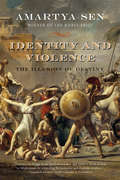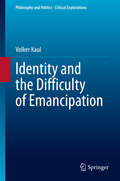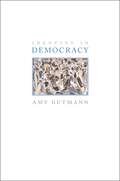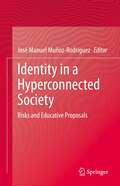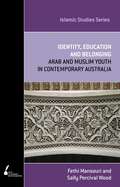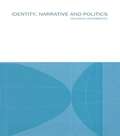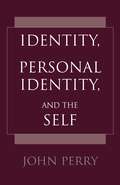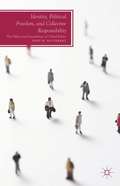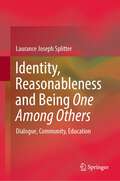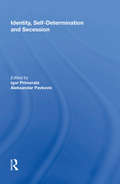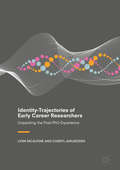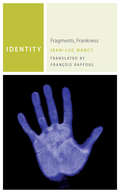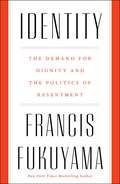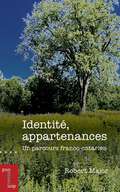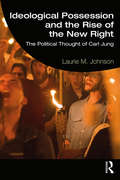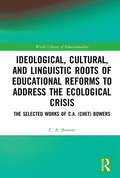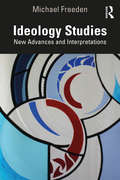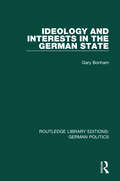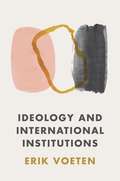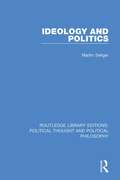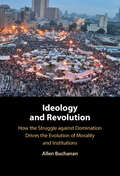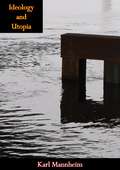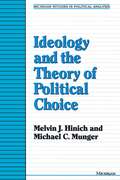- Table View
- List View
Identity and Violence: The Illusion of Destiny (Issues of Our Time)
by Amartya Sen"One of the few world intellectuals on whom we may rely to make sense out of our existential confusion."--Nadine Gordimer In this sweeping philosophical work, Amartya Sen proposes that the murderous violence that has riven our society is driven as much by confusion as by inescapable hatred. Challenging the reductionist division of people by race, religion, and class, Sen presents an inspiring vision of a world that can be made to move toward peace as firmly as it has spiraled in recent years toward brutality and war.
Identity and the Difficulty of Emancipation (Philosophy and Politics - Critical Explorations #13)
by Volker KaulThis book provides a comprehensive account of the phenomenon of identity in politics, featuring for the first time the question of individual emancipation. It addresses the burning questions of our times, viz. nationalism, populism, Islamic fundamentalism, multiculturalism, postsecularism and postcolonialism. The volume repudiates an easy reconciliation between identity and emancipation, such as it occurs in contemporary liberal and multicultural political theories. It shows that we cannot achieve emancipation without Kant’s help, whereas identity relentlessly draws us back to collective values and the community. The book urges for a new understanding of identity and a politics that instead of accommodating identities seeks to govern them. Identity is the buzzword in the humanities and social sciences, but also the most contentious and least conceptualized term. This book intends to bring theoretical clarity into the debate on how identity plays out in politics.
Identity in Democracy
by Amy GutmannWritten by one of America's leading political thinkers, this is a book about the good, the bad, and the ugly of identity politics.Amy Gutmann rises above the raging polemics that often characterize discussions of identity groups and offers a fair-minded assessment of the role they play in democracies. She addresses fundamental questions of timeless urgency while keeping in focus their relevance to contemporary debates: Do some identity groups undermine the greater democratic good and thus their own legitimacy in a democratic society? Even if so, how is a democracy to fairly distinguish between groups such as the KKK on the one hand and the NAACP on the other? Should democracies exempt members of some minorities from certain legitimate or widely accepted rules, such as Canada's allowing Sikh members of the Royal Canadian Mounted Police to wear turbans instead of Stetsons? Do voluntary groups like the Boy Scouts have a right to discriminate on grounds of sexual preference, gender, or race? Identity-group politics, Gutmann shows, is not aberrant but inescapable in democracies because identity groups represent who people are, not only what they want--and who people are shapes what they demand from democratic politics. Rather than trying to abolish identity politics, Gutmann calls upon us to distinguish between those demands of identity groups that aid and those that impede justice. Her book does justice to identity groups, while recognizing that they cannot be counted upon to do likewise to others. Clear, engaging, and forcefully argued, Amy Gutmann's Identity in Democracy provides the fractious world of multicultural and identity-group scholarship with a unifying work that will sustain it for years to come.
Identity in a Hyperconnected Society: Risks and Educative Proposals
by José Manuel Muñoz-RodríguezThis book is about the formation of identity, primarily in adolescents, and the danger inherent in creating that identity in the context of a hyperconnected world. It provides scientific and regulatory pedagogical knowledge associated with these risks in creating identity, primarily among young people, arising from increasing, and increasingly important, screen connection times. It proposes solutions to the educational challenges of constructing identity in a hyperconnected society. The book focuses especially on the process of identity formation in this instance, where both adolescents and the adults who teach them have forgotten the vital need to incorporate educational theories and principles, novel, experimental and basic, kn any discussion of adolescent identity work.
Identity, Education and Belonging: Arab and Muslim Youth in Contemporary Australia (Islamic Studies Series)
by Fethi Mansouri Sally Percival WoodIdentity, Education and Belonging examines the social and educational experiences of Arab and Muslim Australian youth against a wider political backdrop.Arab and Muslim Australian youth have long faced considerable social obstacles in their journey towards full integration, but as the discourse of insecurity surrounding these conflicts intensifies, so too do the difficulties they face in Australian society. Events such as the war in Iraq, Australia's presence in Afghanistan and perceptions of Iran as a nuclear threat—together with domestic events such as the Cronulla riots—place Arabs and Muslims at the centre of global instability and exacerbate feelings of tension and anxiety.At a time when fear and confusion permeate their experiences, Identity, Education and Belonging is an all-important study of the lives of Muslim and Arab youth in Australia. Islamic Studies Series - Volume 2
Identity, Narrative and Politics
by Maureen WhitebrookIdentity, Narrative and Politics argues that political theory has barely begun to develop a notion of narrative identity; instead the book explores the sophisticated ideas which emerge from novels as alternative expressions of political understanding. This title uses a broad international selection of Twentieth Century English language works, by writers such as Nadine Gordimer and Thomas Pynchon.The book considers each novel as a source of political ideas in terms of content, structure, form and technique.The book assumes no prior knowledge of the literature discussed, and will be fascinating reading for students of literature, politics and cultural studies.
Identity, Personal Identity and the Self
by John PerryThis volume collects a number of Perry's classic works on personal identity as well as four new pieces, The Two Faces of Identity,Persons and Information,Self-Notions and The Self, and The Sense of Identity. Perry's Introduction puts his own work and that of others on the issues of identity and personal identity in the context of philosophical studies of mind and language over the past thirty years.
Identity, Political Freedom, and Collective Responsibility
by Eddy M. SouffrantEddy M. Souffrant calls for a reassessment of the starting points of moral, social, and political philosophy that takes into account the actual living circumstances of persons living the 21st century.
Identity, Reasonableness and Being One Among Others: Dialogue, Community, Education
by Laurance Joseph SplitterThis book brings the tools and ideas of Anglo-American analytic philosophy to bear on how we think about issues of contemporary significance, in a way that is accessible to a broad audience. While acknowledging empirical findings within the social sciences, it takes on the prescriptive task of imagining a better world, in which being citizens in a democracy means actively engaging with others. We cling to tribal affiliations which incline us to look inward and spurn those whom we deem to be “other.” And we observe the mind-numbing, herd-like impact of social (and other) media on our capacity – and that of our children – to distinguish truth and good sense from falsehood and nonsense. Such problems demand our attention as reasonable persons who both think for themselves, and deliberate in good faith with others with whom they may well disagree. The good news is that while reasonableness cannot be taken for granted, it can – indeed, it must – be nurtured and it must be taught. This book both articulates a conception of reasonableness and exemplifies a clear standard of reasonableness, with respect to the questions it raises and the author's responses to them.
Identity, Self-Determination and Secession
by Igor Primoratz Aleksandar PavkovicEngaging with a range of interconnected and highly topical issues of identity, self-determination and secession, this book examines the import and implications of 'identity claims', and looks into 'identity politics' motivated by such claims, which is becoming ever more salient in democratic and culturally and ethnically heterogeneous states. It discusses nationalism as an important component of identity of individuals and groups, and a position that generates claims of self-determination and secession on the part of ethnic and cultural groups. It also examines patriotism, which until recently seemed to be on the wane, but has undergone a dramatic revival after the terrorist attacks in the US on 11 September 2001 and the start of a global 'war on terror'. The book offers a typology of facets of patriotism, an assessment of its moral standing, and a critique of the beliefs about the patria it characteristically involves. Also discussed are topics such as political liberalism vs. 'identity liberalism', the ways a liberal society should treat nonliberal communities within it, the role of heritage and remembrance in national identity, the status of national minorities as an issue of equality, arrangements concerning indigenous peoples and intrastate autonomy as an alternative to secession, and whether secession can be a legal act. The book includes contributions by prominent philosophers and political and legal theorists from Australia, Canada, Israel, and the United States.
Identity-Trajectories of Early Career Researchers: Unpacking the Post-PhD Experience
by Cheryl Amundsen Lynn McAlpineThe book asks how we can make sense of career paths for PhD graduates, something that has rarely been systematically studied. It offers a coherent synthesis of the empirically-based insights that arose from the experiences of 48 early career researchers, who were participants in a 10-year qualitative longitudinal research program. The book has the power to inform other researchers’ conceptual and methodological approaches to the study of post-PhD career trajectories. The authors draw on the conceptual lens of ‘identity-trajectory’, which emerged from their research program, to examine the decision-making processes underpinning the careers of PhD graduates, whether contingent researchers and teachers, assistant professors within the academy or professionals elsewhere. The book highlights the role of personal agency in negotiating academic and non-academic work and careers within broader personal lives. It will be compelling reading for researchers and students working in the areas of Education and Sociology, particularly those with an interest in examining career development and decision-making.
Identity: Fragments, Frankness (Commonalities)
by Jean-Luc NancyIdentity: Fragments, Frankness is a rich and powerful essay on the notion of identity and on how it operates in our contemporary world. In contrast to the various attempts to cling to established identities or to associate identity with dubious agendas, Nancy shows that an identity is always open to alterity and its transformations.Against cynical initiatives that seek to instrumentalize the question of identity in an attempt to manipulate sentiment against immigration, Nancy problematizes anew the notions of identity, nation, and national identity. He seeks to show that there is never a given identity but always an open process of identification that retains an exposure to difference. Thus identity can never operate as a self-identical subject, such as “the French.”Ultimately, for Nancy, one does not have an identity but has to become one. One can never return to a self-same identity but can only seek to locate oneself within difference and singularity. Nancy shows the impasse of a certain conception of identity that he calls the “identity of the identifiable,” which refers to some permanent, given, substantial identity. In opposition to such identity, Nancy offers the identity of whatever or whoever invents itself in an open process of exposure to others and internal difference. Hence, an identity is never given but “makes itself by seeking and inventing itself.” One does not have an identity, but is an identity.Identity is an act, not a state.This important book will provide much-needed philosophical clarification of a complex and strategic notion at the center of many current events and discussions.
Identity: The Demand for Dignity and the Politics of Resentment
by Francis FukuyamaThe New York Times bestselling author of The Origins of Political Order offers a provocative examination of modern identity politics: its origins, its effects, and what it means for domestic and international affairs of stateIn 2014, Francis Fukuyama wrote that American institutions were in decay, as the state was progressively captured by powerful interest groups. Two years later, his predictions were borne out by the rise to power of a series of political outsiders whose economic nationalism and authoritarian tendencies threatened to destabilize the entire international order. These populist nationalists seek direct charismatic connection to “the people,” who are usually defined in narrow identity terms that offer an irresistible call to an in-group and exclude large parts of the population as a whole. Demand for recognition of one’s identity is a master concept that unifies much of what is going on in world politics today. The universal recognition on which liberal democracy is based has been increasingly challenged by narrower forms of recognition based on nation, religion, sect, race, ethnicity, or gender, which have resulted in anti-immigrant populism, the upsurge of politicized Islam, the fractious “identity liberalism” of college campuses, and the emergence of white nationalism. Populist nationalism, said to be rooted in economic motivation, actually springs from the demand for recognition and therefore cannot simply be satisfied by economic means. The demand for identity cannot be transcended; we must begin to shape identity in a way that supports rather than undermines democracy.Identity is an urgent and necessary book—a sharp warning that unless we forge a universal understanding of human dignity, we will doom ourselves to continuing conflict.
Identité, appartenances: Un parcours franco-ontarien (Essais et fiction)
by Robert MajorThis book examines the Franco-Ontarian reality through the telling of an individual journey, that is representative of a generation. This account integrates autobiography, reflection, readings and research. A contemplation on the University of Ottawa and its historical role, which is the culmination of this particular journey, is the primary theme of the book.Its fundamental question: what does it mean to be Franco-Ontarian? Does it still make sense to hold on to a particular collective identity? Identities are often deadly, unfortunately, as history reveals. In the absolute, we are all human, brothers and sisters, fragile, destined for certain death, dust in the infinite, insignificant in space-time. "What is a man in infinity?" Pascal would have said. Why, then, should we cling to our particularities, drape them over ourselves with pride, or brandish them as banners? It's to glory in the accidents of one's selfhood, the chance of one's birth, the contingencies of one's true nature, that of being a human among other humans.And yet, nothing can be done about it. We can't choose our roots: they were there before we were born, and they pushed us towards the light. Everyone comes from a family, a group, a space, a culture, a people, and a nation. For we are not abstractions, nor pure spirits. We are embodied in a collective. The individual carries the group within him, and vice versa. With all the wealth and suffering that entails.
Ideological Possession and the Rise of the New Right: The Political Thought of Carl Jung
by Laurie M. JohnsonPolitical theorist Laurie M. Johnson deals with Jung’s analysis of the effects of modern scientific rationalism on the development of communism, fascism and Nazism in the 20th century and applies this analysis to the rise of the New Right in the 21st century. Jung’s thought provides much needed insight into contemporary ideologies such as neoliberalism, Identitarianism and the Alt-Right. Johnson explains Jungian analytical psychology as it relates to these topics, with a chapter devoted to Jung’s views of Friedrich Nietzsche, who exemplifies the modern problem with his proclamation that God is dead, and an in-depth discussion of Jung’s views on truth and the psychological function of religion as a safeguard against deadly mass movements. She then turns to Jung’s treatment of anti-Semitism and the Nazi movement, and his views on race and racism. Johnson applies these historical insights to the current manifestations of mass psychological disruption in the clash between neoliberals and the right-wing populist and Identitarian movements on the rise in North America and Europe. She concludes by discussing the search for an authentic and meaningful life in a West that rejects extremism and is open to authentic spiritual experiences as a counterbalance to mass mindedness. Ideological Possession and the Rise of the New Right will appeal to both undergraduate and graduate students of psychology and intellectual history. The book will also be of interest to those wishing to understand the new nationalist, nativist and Identarian movements.
Ideological, Cultural, and Linguistic Roots of Educational Reforms to Address the Ecological Crisis: The Selected Works of C.A. (Chet) Bowers
by C. A. BowersIn this volume C.A. (Chet) Bowers, whose pioneering work on education and environmental and sustainability issues is widely recognized and respected around the world, brings together a carefully curated selection of his seminal work on the ideological, cultural, and linguistic roots of the ecological crisis; misconceptions underlying modern consciousness; the cultural commons; a critique of technology; and educational reforms to address these pressing concerns. In the World Library of Educationalists series, international scholars themselves compile career-long collections of what they judge to be their finest pieces – extracts from books, key articles, salient research findings, major theoretical and/practical contributions – so the world can read them in a single manageable volume. Readers will be able to follow the themes and strands of their work and see their contribution to the development of a field, as well as the development of the field itself. Contributors to the series include: Michael Apple, James A. Banks, Joel Spring, William F. Pinar, Stephen J. Ball, Elliot Eisner, Howard Gardner, John Gilbert, Ivor F. Goodson, and Peter Jarvis.
Ideology (Concepts Social Thought Series)
by David McLellan Gregory McLellanTo study ideology is to ask such questions as: Where do our ideas about society and politics come from? Are these ideas socially determined? <P><P>If so, what validity can they claim? In this brief yet comprehensive introduction, David McLellan examines the origins of the concept of ideology, analyzes its place in the Marxist and non-Marxist traditions, and assesses the various uses to which it has been put in recent social and political theory, particularly the connection between ideology and the "end of history" debate. <P><P>Revised and updated, this second edition is for all those who are interested in a clear presentation of the most basic concept in the philosophy of the social sciences.
Ideology Studies: New Advances and Interpretations
by Michael FreedenThis book comprehensively collects the thinking - over the last 25 years - of one the most important contemporary scholars in the field of ideology studies. Clearly organised, it expounds on the changing nature of the sub-discipline, its components and methods of investigation. As such, it serves the need for a general, well-informed identification and elaboration of thematic possibilities in current ideology studies and represents the most developed and productive methodological approach to the study of ideologies in the last three decades. Freeden presents ideology studies as an evolving and vibrant field, encountering and surmounting a series of challenges in its successful path towards recognition as a fully legitimate and respected branch of political theory. This book will be of key interest to students and scholars of political ideologies, political theory, political philosophy and more broadly to sociology, political science, anthropology, human geography, international studies and the humanities.
Ideology and Interests in the German State (Routledge Library Editions: German Politics)
by Gary BonhamThis book addresses major theoretical issues in the fields of public administration and comparative politics. It discusses the role which ideology played as a unifying force for at least parts of the German state bureaucracy in Wilhelmine Germany . The examination of a modernizing ideology in the German case is useful for an understanding of the political dynamics of state-led modernization and industrial strategy in many contemporary societies and the author explains political behaviour and relations in Germany in general terms that are universally relevant.
Ideology and International Institutions
by Erik VoetenA new theoretical framework for understanding how social, economic, and political conflicts influence international institutions and their place in the global order Today’s liberal international institutional order is being challenged by the rising power of illiberal states and by domestic political changes inside liberal states. Against this backdrop, Ideology and International Institutions offers a broader understanding of international institutions by arguing that the politics of multilateralism has always been based on ideology and ideological divisions. Erik Voeten develops new theories and measures to make sense of past and current challenges to multilateral institutions.Voeten presents a straightforward theoretical framework that analyzes multilateral institutions as attempts by states to shift the policies of others toward their preferred ideological positions. He then measures how states have positioned themselves in global ideological conflicts during the past seventy-five years. Empirical chapters illustrate how ideological struggles shape the design of international institutions, membership in international institutions, and the critical role of multilateral institutions in militarized conflicts. Voeten also examines populism’s rise and other ideological threats to the liberal international order.Ideology and International Institutions explores the essential ways in which ideological contestation has influenced world politics.
Ideology and Politics (Routledge Library Editions: Political Thought and Political Philosophy #52)
by Martin SeligerFirst published in 1976. Ideology plays an important role in many fields of human activity and has therefore been dealt with directly and indirectly in a vast number of studies, but a generally accepted definition of the term is lacking even in the various branches of social and political science. This book - the first since Mannheim to elaborate a comprehensive theory of ideology - seeks to offer a generally applicable definition, a task which of necessity involves taking issue with the logical and political implications of the conceptions in current use and which touches on central problems of politics and political science. Professor Seliger's theory is based on an approach and conceptualizations which will appeal both to ’traditionalists’ and 'behaviourists' since he gives due weight to both kinds of literature. Indeed, this book reflects throughout a detachment and independence of thought which are refreshing and opens up the way for both theorists and practising politicians to re-examine ideological tenets in the light of actual and feasible policy orientations and embark upon ideological reconstruction.
Ideology and Revolution: How the Struggle against Domination Drives the Evolution of Morality and Institutions
by Allen BuchananIn our society there is a constant struggle between powerful, institutionalized hierarchies and people who try to resist them. Whether this resistance succeeds (either partially or completely) or fails, the struggle causes large-scale social change, including changes in morality and institutions and in how hierarchy and the struggle itself are conceived. In this book, Allen Buchanan analyzes the complex connections between the struggle for liberation from domination, ideology, and changes in morality and institutions, and develops a conflict theory of social change, which is systematically laid out in five clear components with a chapter dedicated to each. He examines the co-evolutionary and co-dependent nature of the struggle between hierarchs and resisters, and the appeals to morality which are routinely made by both sides. His book will be of interest to a broad readership of students and scholars in philosophy, history, political science, economics, sociology, and law.
Ideology and Utopia: An Introduction To The Sociology Of Knowledge (Routledge Classics In Sociology Ser.)
by Karl MannheimThis book is concerned with the problem of how men actually think. The aim of these studies is to investigate not how thinking appears in textbooks on logic, but how it really functions in public life and in politics as an instrument of collective action.Philosophers have too long concerned themselves with their own thinking. When they wrote of thought, they had in mind primarily their own history, the history of philosophy, or quite special fields of knowledge such as mathematics or physics. This type of thinking is applicable only under quite special circumstances, and what can be learned by analysing it is not directly transferable to other spheres of life. Even when it is applicable, it refers only to a specific dimension of existence which does not suffice for living human beings who are seeking to comprehend and to mould their world.Meanwhile, acting men have, for better or for worse, proceeded to develop a variety of methods for the experiential and intellectual penetration of the world in which they live, which have never been analysed with the same precision as the so-called exact modes of knowing. When, however, any human activity continues over a long period without being subjected to intellectual control or criticism, it tends to get out of hand.
Ideology and the Theory of Political Choice
by Melvin J. Hinich Michael C. MungerThere is no unified theory that can explain both voter choice and where choices come from. Hinich and Munger fill that gap with their model of political communication based on ideology. Rather than beginning with voters and diffuse, atomistic preferences, Hinich and Munger explore why large groups of voters share preference profiles, why they consider themselves "liberals" or "conservatives. " The reasons, they argue, lie in the twin problems of communication and commitment that politicians face. Voters, overloaded with information, ignore specific platform positions. Parties and candidates therefore communicate through simple statements of goals, analogies, and by invoking political symbols. But politicians must also commit to pursuing the actions implied by these analogies and symbols. Commitment requires that ideologies be used consistently, particularly when it is not in the party's short-run interest. The model Hinich and Munger develop accounts for the choices of voters, the goals of politicians, and the interests of contributors. It is an important addition to political science and essential reading for all in that discipline. "Hinich and Munger's study of ideology and the theory of political choice is a pioneering effort to integrate ideology into formal political theory. It is a major step in directing attention toward the way in which ideology influences the nature of political choices. " --Douglass C. North ". . . represents a significant contribution to the literature on elections, voting behavior, and social choice. " --Policy Currents Melvin Hinich is Professor of Government, University of Texas. Michael C. Munger is Associate Professor of Political Science, University of North Carolina.
Ideology in America
by Christopher Ellis James A. StimsonPublic opinion in the United States contains a paradox. The American public is symbolically conservative: it cherishes the symbols of conservatism and is more likely to identify as conservative than as liberal. Yet at the same time, it is operationally liberal, wanting government to do and spend more to solve a variety of social problems. This book focuses on understanding this contradiction. It argues that both facets of public opinion are real and lasting, not artifacts of the survey context or isolated to particular points in time. By exploring the ideological attitudes of the American public as a whole, and the seemingly conflicted choices of individual citizens, it explains the foundations of this paradox. The keys to understanding this large-scale contradiction, and to thinking about its consequences, are found in Americans' attitudes with respect to religion and culture and in the frames in which elite actors describe policy issues.
